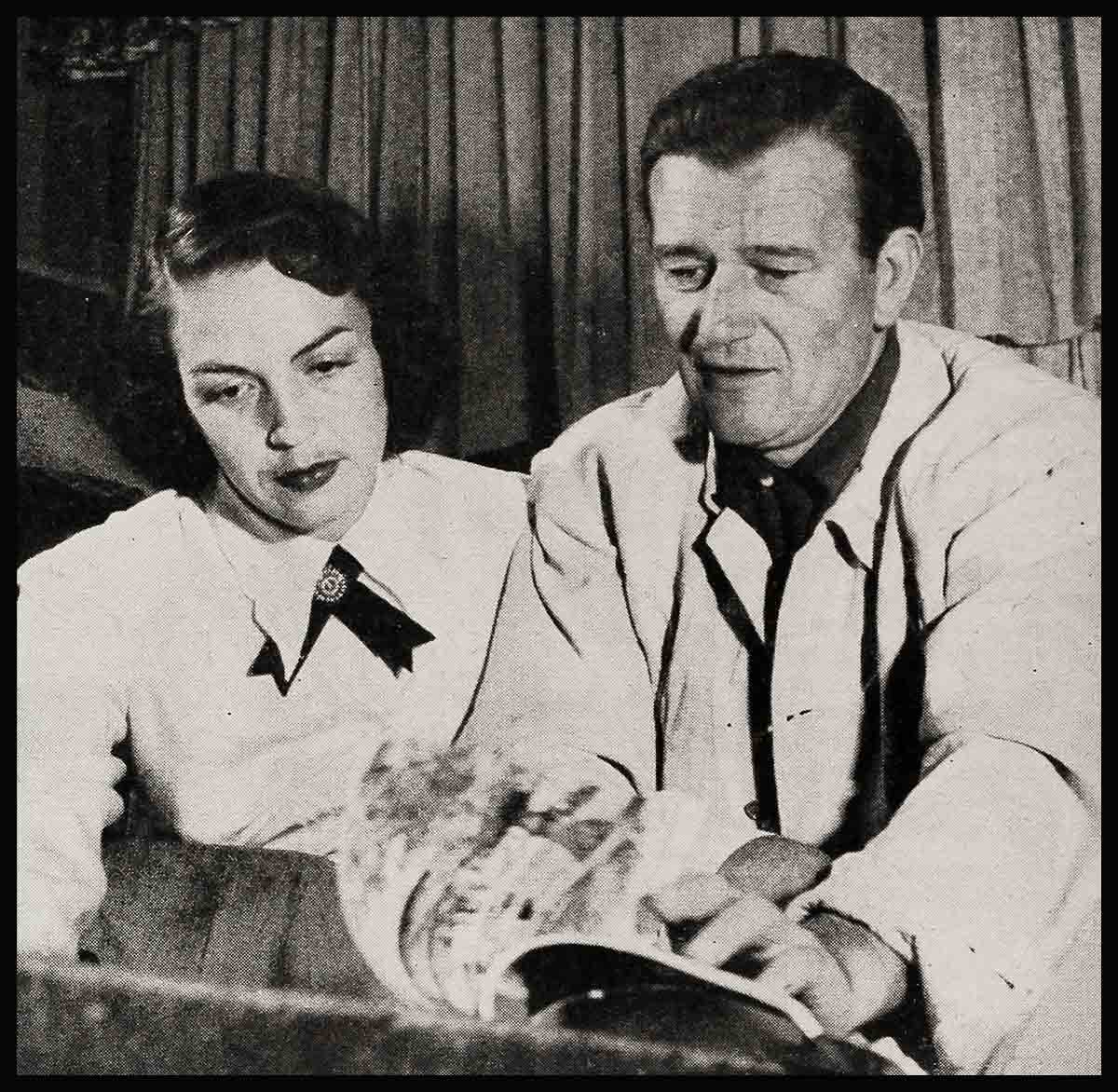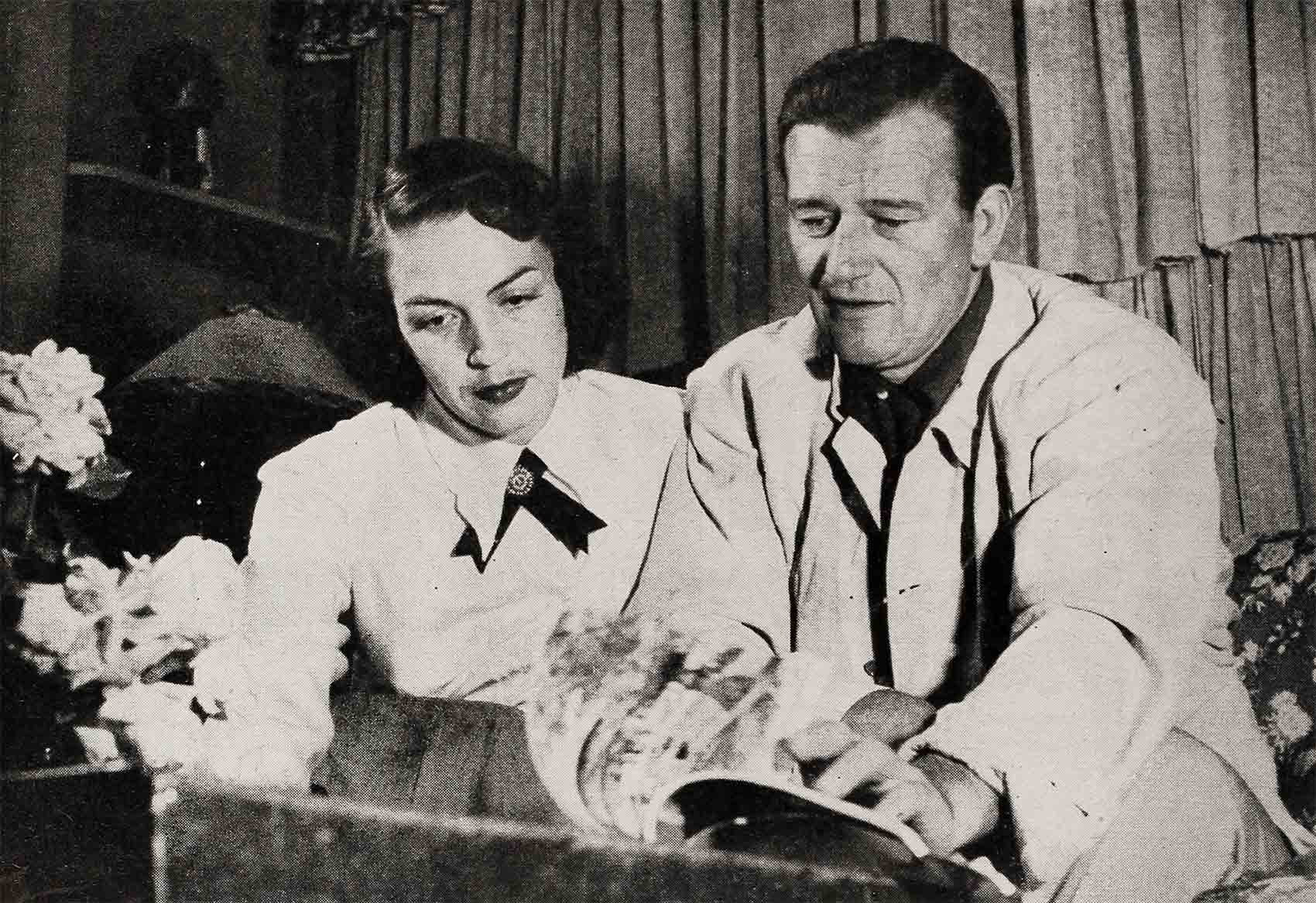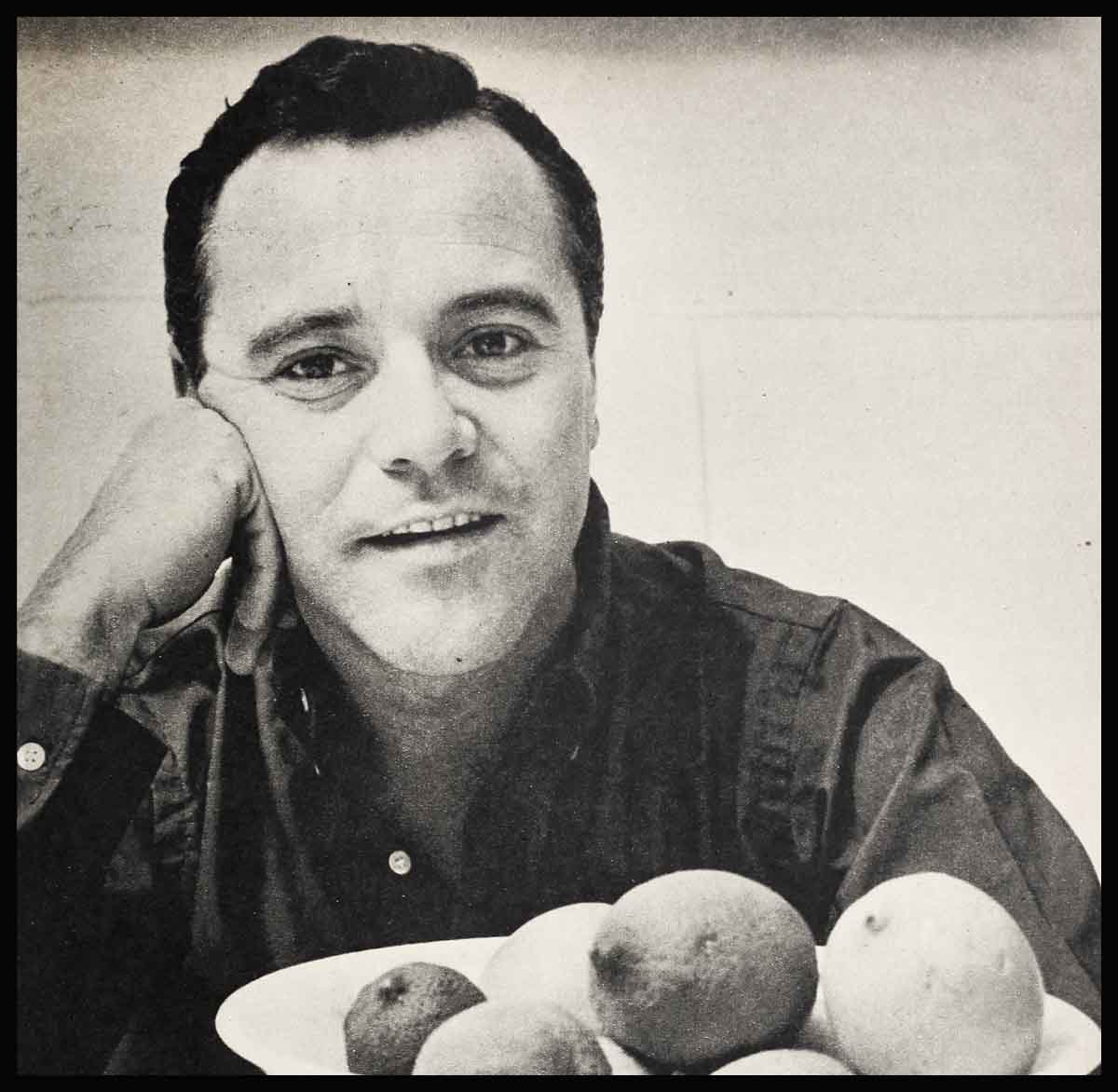
It Had To Happen—John Wayne & Esperanza Baur
If you have money, and let’s face it, John Wayne does, there are only three places for you to stay in Lima, Peru.
One is the Hotel Crillon. Another is the Hotel Bolivar, and the third is the Country Club of Lima.
As anyone who knows Duke Wayne will testify, he is not the country club type, so a few weeks ago, while traveling through South America, he very quietly, very unobtrusively checked into the Crillon—no fuss, no publicity, no fanfare.
Now the Limeños, residents of Lima, are avid movie-goers—in fact there are more motion picture theatres per capita in Lima than in any other South American city. But the Limeños did not spot Duke right away.
It was a nine-year-old boy from Rochester, N. Y., who pulled the trick. He saw Duke ambling through the lobby and ran to his mother. “Look, mama,” he shouted, excitedly pointing to the actor, “There’s John Wayne!”
“Seymour,” said the mother. “That can’t be John Wayne. He’s in California, in Hollywood.”
Seymour insisted. “I saw him on television before we left home. I know he’s John Wayne. Just look at his nose.”
The lady rose, but Duke hurried through the lobby, walked out, entered a cab with a friend of his, Nate Edwards, and drove off. Seymour’s mother strode over to the desk clerk.
“Puede Vd. decirme,” she began, “si este hombre is John Wayne?”
The clerk smiled and replied in English. “Yes, madame. That’s John Wayne, the North American actor.”
Seymour’s mother still couldn’t believe it. “What in heaven’s name?” she said, talking more to herself than anyone else, “is he doing in Peru?”
The official answer to that question, the. answer Duke gave everyone who asked it, was that he was scouting locations for several motion pictures he plans to make next year, films like Pagoda, Alamo, and a few others.
The unofficial reason for the South American trek is that Duke is still trying to forget his Chata—the pug-nosed Mexican beauty he married in 1946 who is about to divorce him, if she hasn’t already.
Chata—the word means pug-nose—is Duke’s nickname for Esperanza Bauer Wayne. Esperanza itself means “hope” in Spanish, but, according to Duke and his quick silver wife, there is no longer any hope for a reconciliation. Their marriage is finished.
Before he left for South America, Duke phoned his attorney and said, “Frank, I want you to clean this up. Chata and I are finished. I’m not going to let her keep me dangling any longer. I can’t go on like this, waiting for her to make up her mind whether or not she wants me. I’ve got to keep my self-respect, too. You get together with Giesler and work out some sort of property settlement.”
Chata’s lawyer is attorney, Jerry Giesler. Like all good lawyers, Giesler prefers reconciliation to divorces, but he himself says, “It doesn’t seem as if there’s much chance of these two getting together. They’ve been married six years, you know, and under the law Mrs. Wayne is entitled to 50% of the community property. Mr. Wayne’s business affairs, however, are supervised by one of those business management concerns. It’s very complicated, and the settlement will take some time to work out. I thought Mr. Wayne would fly to New York for the opening of The Quiet Man, but he evidently decided to stay a while longer in South America.
“I don’t know, of course, but my guess is that he’ll be back in Hollywood by October at which time, unless circumstances change, Mrs. Wayne will probably file for divorce.”
During his six-year marriage to Chata, Duke has earned a million dollars and invested a sizeable share in prudent and diversified businesses. A few of his holdings, for example, consist of a hotel in Culver City, oil wells in Jack County, Texas, partnership in a northern California duck club, real estate in Los Angeles, a frozen food establishment called the Polar Pantry, and a four-acre estate in the San Fernando Valley, valued at $140,000.
Since Chata by law is entitled to one half in some of these investments, you can see that Duke’s second divorce is going to cost him a pretty penny. In his first marital mishap, his wife was awarded custody of his four children, two girls and two boys, and Duke has been paying for their support since their birth.
In Duke’s philosophy of life, money has never been the primary consideration. To Wayne love and loyalty are infinitely more valuable—the love of a good woman and the loyalty of good friends. These are the mainstays of his existence. Pull down one of these pillars and Wayne is lost and miserable, two adjectives which best describe the state of his feelings during the South American junket.
To forget about Chata, Duke wanted to go into another picture immediately. They offered him Vaquero over at MGM, but he wasn’t particularly enthusiastic about the script and turned it down. Warner’s then came up with Alma Mater, the story of Slip Madigan, the football coach at St. Mary’s College. Duke agreed to do that one but first asked Jimmy Grant, one of his writer-pals, to make some script changes. When he was told that the picture wouldn’t be ready to go. until October, Duke was taken aback. He needed something to take his mind off Chata. He didn’t want to hang around the house, because the house reminded him of his wife; and she might show up any minute, and he knew that he’d succumb to her charms, and once more they’d be off on that strange marital merry-go-round.

Duke packed his bags and sub-let Helen Mack’s house. Into his own house moved Webb Overlander’s relatives. Webb is a friend of Duke’s. At the same time, Wayne agreed to rent his house to some socialites from the East for $1500 a month. “Webb’s gang’ll move out,” he told them, “whenever you want to move in.”
No sooner had Duke pulled out than Chata returned from Mexico. When she arrived at her house and found strangers there, the fiery Esperanza told them in no uncertain terms to scram. She fired the servants, got in touch with Wayne’s lawyer and told him that she had no intention of renting her house. The lawyer explained that she had been notified of Duke’s intention and offered her half the rent. Chata, in her characteristically Latin manner, told him it was no soap. She was determined to live in the house, and, as for Mr. Wayne, well, she hoped he was having a fine time in South America.
The tragic part about the breakup of Duke Wayne’s marriage is that he and Chata are still very much in love with each other. They have never fallen out of love; yet they can’t live together without fighting—not for any appreciable length of time. And they’ve come to the conclusion that their heartache outweighs the physical and mental attraction each holds for the other.
Grant Withers and his Cuban girl friend Estrellita, who know Duke and Chata as well as any two people in Hollywood, say, “It’s a terrible shame. Here are two wonderful characters who just can’t make a go of it. They’ve tried everything in the book. Maybe it’s personality differences, maybe something else. Frankly, we don’t know and it’s none of our business, but it’s a shame, because when those two were happy—well, you couldn’t meet a grander couple.”
How long were they happy? From all reports, Chata was most happy when she could talk Duke into spending some time with her in Mexico. She’s never been particularly ecstatic about life in Hollywood. She has virtually no close friends in the movie colony. Allegedly, whenever Duke went on location, Chata would wing back to Mexico City or Acapulco.
Friends have said from time to time that the crux of the marital difficulty could be traced to Duke’s killing work-schedule, that for many years he’s had small time for play or social life, that whatever weekend time he did manage, he spent with his four children who range in age from ten to nineteen. Others say it was mother-in-law trouble and Chata’s inability to give birth to a child of her own.
Undoubtedly, each of these factors was a contributory cause to the breakup. In all fairness to Duke, however, it must be said that he did everything humanly possible to make Chata happy, except change his own personality. He even went so far as to offer her the leading lady role in Pagoda. Chata starred in three or four Mexican pictures before Duke married her, and he thought for a while that she might be yearning for a career.
Neither that offer nor their second honeymoon in Honolulu this past spring seemed to do the trick.
A few weeks ago Duke finally concluded that he couldn’t take any more of Chata’s unpredictable behavior and that insofar as he was concerned; the sooner the marriage was dissolved the better.
Now that he’s without a woman he seems lost. In South America he got so lonely that he phoned some of his old pals and asked them to fly into Lima.
Gossips say that Duke has already picked out his third wife, beautiful Maureen O’Hara with whom he starred in The Quiet Man. This picture was shot in Ireland last Summer, at which time Chata flew over with some of Wayne’s children by his previous marriage. So there is no truth to the rumor that Duke and Maureen fell in love while making the film. Maureen has since obtained a divorce, but she and Duke haven’t seen each other for months.
There is no doubt but what Wayne will get married again. More than 90% of the men who have been married twice try it a third time, and Duke is not going to be an exception. He doesn’t mind working hard—in fact, he loves making movies more than anything else on earth. But when he finishes a hard day’s work, he likes to go home to a woman, an easy chair and a drink.
At 45 a man becomes a slave more or less to his habits, and these are Duke’s. Without them he’s unfulfilled. Not that you’ll ever hear him complain. He’s, too stoic for that.
One of his pals who made the South America trek with him and has since returned, says, “Years ago, it was different. I remember when Josephine divorced Duke (his first wife was Josephine Saenz), it hurt him, of course, because underneath everything he’s a sensitive guy, but he took it in stride. Back then he’d call up some of the old gang, they’d go camping and carousing for a couple of weeks. Now Duke can’t do that. To begin with, he hasn’t got the urge and he’s got too many picture commitments. A very funny thing about this guy—the better his career, the worse his married life.
“Right now he’s got three pictures out, Jim McLain, The Quiet Man, and Jet Pilot, but look what’s happened to his marriage? Maybe it’s because he has a yen for Latin-American girls, and they’re not his type. He’ll probably marry the same kind again—but somehow I’d like to see him try an American girl. He’s the most American guy I know, and I think he should marry some corn-fed babe from Iowa.”
Duke’s only answer to his marital breakup is to schedule as many pictures and as much work for himself as possible. Work, he believes is the only anodyne for heartache.
THE END
—BY RICHARD DEXTER
It is a quote. MODERN SCREEN MAGAZINE NOVEMBER 1952





No Comments